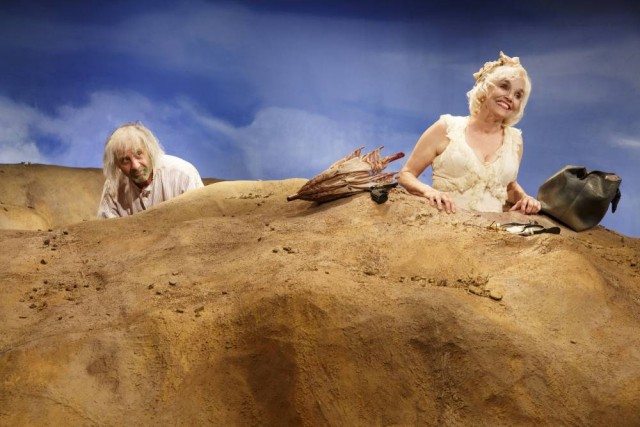

To see a work by the absurdist playwright Samuel Beckett means checking certain aspects of common logic at the door, and letting the master throw you head first into a universe of his own imagining -- one that is often bleak but always witty, where men live in holes, and women find themselves buried alongside. So it goes in The Theatre @ Boston Court's production of Happy Days, one of Beckett's slightly lesser known works, penned in 1960, which has now made its way onstage at the Flea after successful runs in LA and Boston.
Despite her aforementioned dilemma of being buried up to her waist in arid dirt, the slightly-past-middle-aged Winnie (Brooke Adams) is making do. She regiments her day carefully, placing ritualistic significance on simple daily tasks -- brushing her teeth, putting on lipstick, combing her hair (she pulls these sundries from a cavernous bag perched at her side) -- and remains positive with an obsessive, mantra like sincerity. "Oh, it's going to be another happy day!" she declares into the vast desert that surrounds them, and seems to believe it.
Winnie passes the days in between sleep by fashioning fragments of memory and history from the wells of her brain into a non-stop, one sided dialogue, even though she isn't alone; her husband Willie (Tony Shalhoub) lives behind her, unburied, in a hole, and he is handling their situation with far less dignity. He won't come out to live in front of her, forcing her to strain and pivot in an effort to see him, and when he indulges Winnie with responses at all, they usually eke out as brusque vulgarities. And yet, Winnie needs him. She talks and talks to pass her time, but with the reassuring knowledge that he's still there behind her: the moments when her carefully balanced mask of positivity slips are when she contemplates life if he were "gone."
Beckett's brilliance often manifests as tedium, resulting in a test of patience and resilience for both the characters and the audience, and director Andrei Belgrader stays true to the minimalism of the concept, allowing the text to dominate. As Winnie, Brooke Adams handles the unwieldy monologue of a script with astoundingly engaging grace and humanity. As Willie, Tony Shalhoub is almost unrecognizable: dirty, almost subhuman, and equal parts fascinating and repulsive in his brief moments on stage.
Beckett's genius sometimes feels inscrutable. He places symbols before us, both small ones: a gun, a music box, a parasol, and those that are much larger, such as the painful image of womanhood unfulfilled, as Winnie both becomes and is consumed by the barren landscape. But perhaps we are, even in the desert, being lead to water. "I suppose this might seem strange," Winnie muses, "were it not that all seems strange." Meaning and meaninglessness are two sides of the same coin, just as Beckett's nihilistic text is countered by its unwaveringly optimistic messenger. As for us, we're the ones left with the choice: shall we valorize and take up Winnie's endless rally in the face of the life's repetition, or shall we, like Willie, let the sadness creep in, and even worse, clamor for the gun.